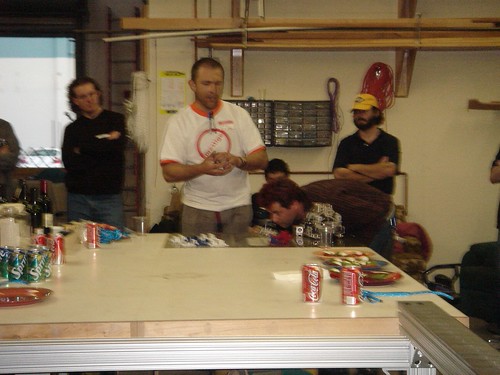In the questions, Ehud asked about the state of social software in the academy. It can probably be summed up as paranoia vs. panacea. Of course, this applies to social software with or without the academy involved. Research into how social software is being used is very raw, very new. It’s hard to give meaningful reports because, mostly, people are just experimenting, not researching. That said, it’s great to see the personal experimentation because it’s the first step to research.
All the same, social software paranoia is definitely hitting the press. The Chronicle of Higher Education published an essay entitled Bloggers Need Not Apply. Anonymously, a humanities professor from the Midwest discusses how blogs were received during the hiring process. I agree with him in parts, but i think that his argument fails.
The reason that your blog matters is because it is part of your “brand” and you get an online identity by writing to mailing lists, writing blogs, commenting on things, etc. And yes, it’s disturbing that we’re moving to a culture of individual brands but that’s always been true in academia. In academia, your brand is this aggregate of your eccentricities and expertise. I do think that you can soil your brand in any public or semi-public environment. This is why you put on a particular face during conferences, at dinner with like minds, etc. Certain institutions have more tolerance for eccentricities than others. My guess is that the Midwest humanities department has virtually none. But find me a prof at MIT that is not quirky as hell. In fact, i think that “normals” would be upsetting there. Academia does not have one consistent personality trait and potential faculty have to find an institution where they match, not just in terms of research, but in terms of personality and passions. In turn, quirky students seek out quirky places and quirky research happens at quirky places.
There is no doubt that all faculty searches include a Google search. Hell, i searched all applicants during mine, not just the narrowed candidates. One of the things i hear most frequently about our new hire is how disturbing it is that he doesn’t have a web presence. Something must be wrong, right? Everything that we could find about him online was accidental, not controlled. Abstracts from conferences, posts to academic Yahoo Groups, etc. You worry about people like this, particularly in the more technical realms.
I feel badly for the students at the authors’ university. Any institution that expects people to stifle their quirks is oppressive in many ways. Of course, it’s probably good that faculty find out that they could not get along with a person before they are brought on campus – saves both groups the headache. But i worry about institutions that point blank exclude anyone who doesn’t spend their lives trying to suppress quirks – institutional identities should emerge as the aggregate of the quirks, not the suppression of them. Homogeneity is not what students need and certainly not what knowledge production needs.
I do wonder how my blog will be received when i apply for faculty positions. Or how my tendency to dress up in bright colors, dread my hair and talk with my hands will be seen. But seriously, if i start wearing suits, remove all piercings and pretend not to know what Burning Man is, i might make it past a faculty hire, but would i ever make it past tenure? Of course a “fuck you, like me for who i am attitude” is not necessarily the most attractive thing either. And besides, i’m definitely past my most rebellious anti-establishment days. What it comes down to is that i have to believe that some of the meritocracy of academia is partially there, even if not entirely. I have to believe that if i do good work, my eccentricities will be less problematic, just as the stupid things that i said on Usenet in the early 90s are less visible in my digital performance thanks to my verbose tendencies.
But seriously, what’s the point of telling a bunch of potential academics that they need to be homogenous, unquirky and unlikely to rock the boat? I’d bet that “Ivan Tribble” is trying to protect current PhDs, but he’s also supporting the status quo. Herein lies the greatest tension to the future of academia – be proud of the quirks and fight or go for status quo to be tolerated.
Update: Some amazing folks have commented on this article and others need to read what they’ve said:
Definitely read other academics who think this is utter bullshit and are cranky with the Chronicle for printing such foolish paranoia.

 Last night, i went to the
Last night, i went to the  My favorite story of the evening came when Saul and gang were discussing rope that they made for
My favorite story of the evening came when Saul and gang were discussing rope that they made for 